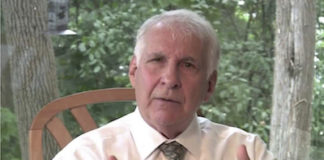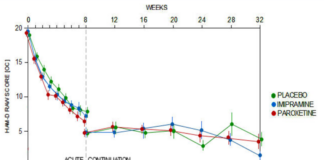Tag: adverse effects of SSRI
David Carmichael—The Antidepressant Safety Tour
Drug safety advocate David Carmichael joins us to discuss his upcoming antidepressant safety tour and the importance of fully informed consent when prescribing SSRI antidepressants.
My Life on Antidepressants
In this piece for Vogue, model and writer Sydney Lima shares her experiences with the adverse effects of Sertraline and Bupropion.
"For the next few months,...
Dr. David Healy: Seeking a Cure for Protracted, Medication-Related Sexual Dysfunction
An interview with Dr. David Healy, internationally respected psychiatrist, psychopharmacologist, scientist, and author, discussing Post SSRI Sexual Dysfunction (PSSD) and his innovative approach to finding a cure.
Peter Breggin, MD: The Conscience of Psychiatry (part 2)
Dr Beggin tells us about recent developments with the Michelle Carter trial, and we discuss alternatives to psychiatric drugs and the value of the therapeutic relationship.
Holly Higgins: Becoming a Nutritional Therapy Practitioner
Holly Higgins shares her experiences of the psychiatric system and psychiatric drugs, how she approached withdrawal from the drugs and talks about how she became a nutritional therapy practitioner.
Terry Lynch: Why Psychiatry Has Pursued a Purely Medical Approach to...
Doctor Terry Lynch is a GP, psychotherapist, author and mental health educator. Ten years into his career as a GP, he became very concerned about the medical approach to emotional and mental suffering and was not prepared to remain silent.
Marion Brown: Psychiatric Drugs, Human Givens Therapy and Medically Unexplained Symptoms
Marion Brown is Psychotherapist who works with the Human Givens approach to supporting people in emotional or psychological distress, she has become increasingly concerned about the effects of psychotropic medications on patients.
Tina: Medication Changes and Antidepressant Withdrawal
Tina talks about her experience with depression, her use of antidepressant drugs and how a change in her medication led to her withdrawal problems.
Nora: Extreme and Sudden Adverse Antidepressant Reactions
Nora tells us about the sudden and extreme adverse reactions that occurred immediately upon starting her antidepressant. She also tells us about the attitude of her doctors and how her life has changed since that short course of treatment.
Daryl: Prescribed Antidepressant Drugs At 9 Years Old
Daryl, who was only 9 years old when he was taken into mental health services and medicated, talks about being made to take both antidepressant and antipsychotic drugs and he describes the lies told to him to justify treatment.
Trial set to Begin in Litigation Over Generic Paxil-Induced Suicide
From The Cook County Record: The trial of Dolin v. GlaxoSmithKline over the alleged paroxetine-induced suicide of Stewart Dolin began on March 14th. The trial is...
SSRIs: Minimal Effectiveness and High Risk
If psychiatry were a bona fide medical field, a meta-analysis of this quality yielding these results would send Richter 9 shock waves through the profession. But the publication of this study on February 8 generated no discernible concern within the profession.
Giovanna: Withdrawing from SSRI Antidepressants After 23 Years
We talk to Giovanna from Australia who was prescribed an antidepressant aged 17 and tried many times to withdraw over the next 23 years. She shares her experiences with us including the advice and support that she received and her hopes for the future.
The Harm Reduction Guide to Coming Off Psychiatric Drugs
Based on more than 10 years work in the peer support movement,The Icarus Project and Freedom Center’s 52-page guide is used internationally by individuals, families, professionals, and organizations to support reducing and coming off psychiatric drugs.
Is Society or Psychiatry to Blame for the “Seriously Mentally Ill”...
Adults in the U.S. diagnosed with “serious mental illness” die on average 25 years earlier than others. This is not controversial, as establishment psychiatry and its critics agree. What is controversial is who is to blame?
Antidepressants Increase the Risk of Suicide and Violence at All Ages
Although the drug industry, our drug regulators and leading psychiatrists have done what they could to obscure these facts, it can no longer be doubted that antidepressants are dangerous and can cause suicide and homicide at any age.
What’s the Harm in Taking an Antidepressant?
We know that all drugs have side effects. That’s just part of the deal right? But is it really possible that an antidepressant can cause a sane person to act like a cold-blooded criminal?
$11.9 Million Paxil Suicide Verdict: The Inside Story
The judicial system and the public are becoming increasingly aware of the hazards of psychiatric drugs, including their capacity to make people behave in ways that are harmful to themselves and others, and contrary to their past behavior and character.
Study 329 Taper Phase
Most doctors still affect surprise at the idea SSRIs might come with withdrawal problems. Regulators knew very clearly since 2002 about the problems, but have decided to leave any communication of these issues in company hands.
Study 329 Continuation Phase
All the fuss about Study 329 centers on its 8-week acute phase. But this study had a 24-week Continuation Phase that has never been published. Until Now.
Sadness: The Problem and The Solution
There is an ever-narrowing bandwidth of behavior that supports the dominant narrative in our culture today. We all need to act a certain way to protect the foundational beliefs of our time – that “science” has it all figured out, that rules keep us safe, and that it’s us vs. them (insert germs, terrorists, pests, and other “enemies”). But what are the consequences of this? What is this sadness and where does it go if we bandage our consciousness with business, medication, substances, or general avoidance of our real human experience?
Violence Caused by Antidepressants: An Update after Munich
The media is now reporting details about the 18-year-old who shot and killed nine and wounded many others before killing himself on July 22 in Munich. My clinical and forensic experience leads to a distinction among people who murder under the influence of psychiatric drugs. Those who kill only one or two people, or close family members, often have little or no history of mental disturbance and violent tendencies. The drug itself seems like the sole cause of the violent outburst. On the other hand, most of those who commit mass violence while taking psychiatric drugs often have a long history of mental disturbance and sometimes violence. For these people, the mental health system seems to have provoked increasing violence without recognizing the danger.
Rising Rates of Suicide: Are Pills the Problem?
If you’ve read recent reports that state “US suicide rates surge to a 30 year high,” you might first justify the reality with the fact that things feel very wrong in our world today. On a personal, national, and planetary level, people are suffering to survive and the distress is coming from all sides – medical to economic to existential. But you probably also wonder why more people are choosing this permanent and self-destructive path, and feel compelled to submit to seemingly logical appeals to provide these individuals more help and greater access to treatment. Surprise: that may be the last thing our population of hopeless and helpless needs. Life’s inevitable challenges are not the problem. It’s the drugs we use that are fueling suicide.
Moving Forward in the Science of Psychiatric Medication Discontinuation/Reduction
This week Live & Learn launched a research study on the experience of people labeled with mental disorders who have tried to stop taking psychiatric medications. This project -- the Psychiatric Medication Discontinuation/Reduction (PMDR) Study -- aims to understand the process of coming off psychiatric medications in order to better support those who choose to do so. The study seeks to answer the question: What helps people stop their psychiatric medications? What gets in the way of stopping?
Prescribing Antidepressants for Girls: Intergenerational Adverse Consequences
Children exposed to SSRIs during pregnancy, a recent study shows, were diagnosed with depression by age 14 at more than four times the rate of children whose mothers were diagnosed with a psychiatric disorder but did not take the medication. Such reports are usually met, appropriately, with an outpouring of reassurances from clinicians who take care of pregnant women, who need to protect their emotional wellbeing in whatever way they can. From my perspective as a pediatrician specializing in early childhood mental health our attention must be on prevention.



























